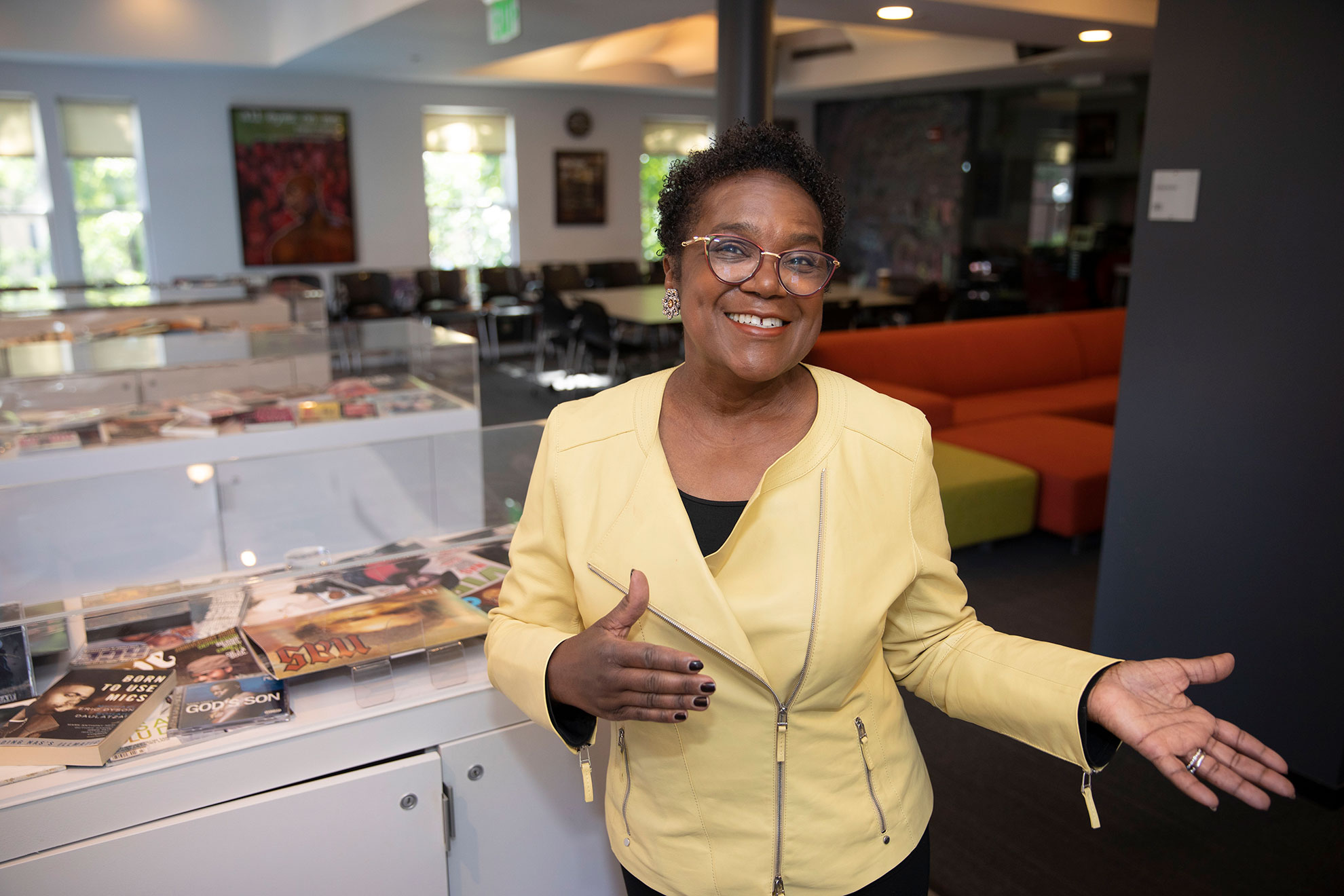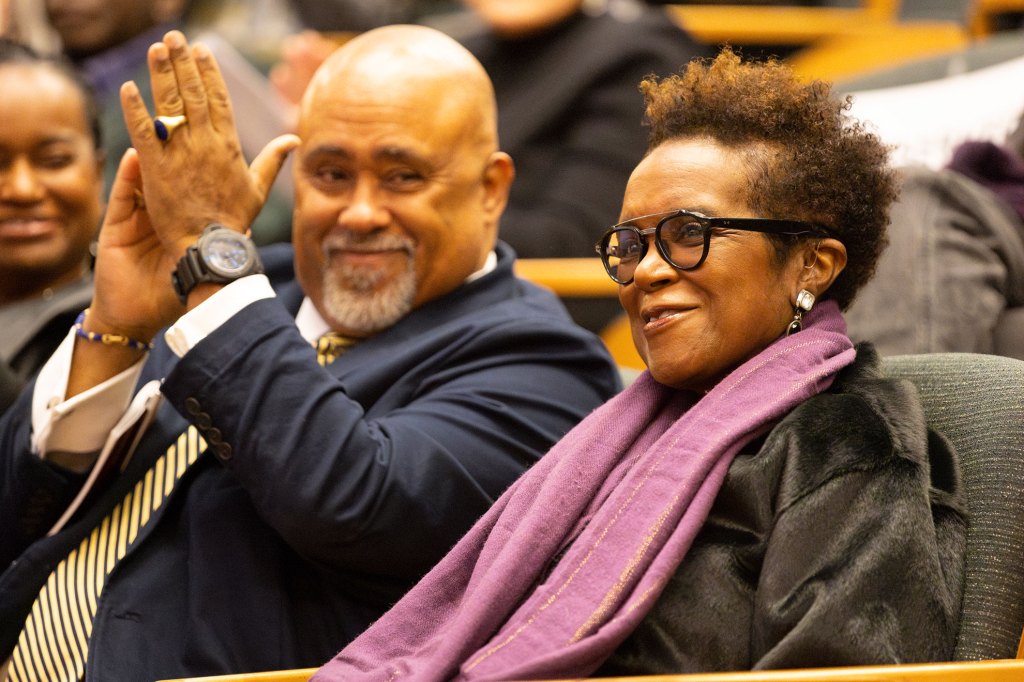She pioneered study of hip-hop as high art

She pioneered study of hip-hop as high art
Harvard renames first-of-its-kind archive after founder Marcyliena Morgan, who died recently at age 75
Today, hip-hop is the world’s most popular music genre by most commercial measures. But that wasn’t the case three decades ago when linguistic anthropologist Marcyliena H. Morgan started pitching Harvard administrators on her big idea: a first-of-its-kind hip-hop archive and academic research center.
“She wanted to give deeper legitimacy to studying this globally influential style of creative production,” recalled her husband of 28 years, Lawrence D. Bobo, W.E.B. Du Bois Professor of the Social Sciences.
Morgan, founding director of Harvard’s Hiphop Archive & Research Institute, died Sept. 28 due to complications from Alzheimer’s disease. The emerita professor of social sciences and of African and African American Studies was 75.
“Marcy will always be remembered as the genius who conceived of the world’s first hip-hop archive and research center,” said Morgan’s longtime colleague and friend Henry Louis Gates Jr., Alphonse Fletcher University Professor and director of the Hutchins Center for African & African American Research.
“She took a holistic view of the hip-hop community. When she did events, there were scholars, there were artists.”
Lawrence D. Bobo
To honor that legacy, Hopi Hoekstra, Edgerley Family Dean of the Faculty of Arts and Sciences, recently approved a new name for the gallery-like space at the Hutchins Center: the Marcyliena H. Morgan Hip Hop Archive & Research Institute.
According to Gates, word of the rechristening was relayed to Morgan a few weeks ago. “I sent a letter that was read at her bedside,” he said.
Morgan, who grew up with five sisters on Chicago’s South Side, earned advanced degrees in linguistics at the University of Essex and University of Pennsylvania. In the early 1990s while teaching a course on urban speech communities at the University of California, Los Angeles, she noticed students submitting essays on innovative patterns of speech used by Ice Cube and other West Coast rappers.
“That drew her attention to this enormous creativity with language on the one hand, and this very powerful youth culture on the other,” said Bobo, a fellow UCLA faculty member at the time. “She ended up dedicating much of the latter part of her career to studying hip-hop culture while trying to preserve and make more broadly understandable its material and cultural production.”
Morgan began amassing a vast collection of hip-hop albums, magazines, fashion, and concert posters while still at UCLA in the 1990s. As Gates recalled, her vision for a museum-quality archive was first articulated to him around 1996.
“At the time, no one could have envisioned that hip-hop would become the lingua franca of youth musical culture worldwide,” Gates observed. “The equivalent would be if W.E.B. Du Bois or Alain Locke in 1925 had thought to document the evolution of this new musical form called jazz.”
After joining Bobo at Harvard in 2002, Morgan wasted no time establishing the archive in the African and African American Studies Department. The Hiphop Archive was briefly relocated to Stanford University, where Morgan and Bobo were on the faculty from 2005 to 2007. Its current space at the Hutchins Center opened in 2008, shortly after the couple’s return to Harvard.
“There were so many people, including many artists, who visited the archive over the years and instantly burst into tears,” Bobo said. “They regarded hip-hop as central to their creative and personal development and were profoundly moved to see it treated with such respect and seriousness.”
At a symposium two years ago, colleagues, friends, and former students marked Morgan’s retirement by celebrating her approach to the discipline. Her 2009 title “The Real Hiphop: Battling for Knowledge, Power, and Respect in the LA Underground” was praised for examining innovative uses of language at a time when most scholars saw hip-hop through the lens of political science or sociology.

“These young people were writing in a form of musical poetry about their feelings, their hopes, their own wisdom, or the wisdom they had received from others,” said colleague and friend Evelyn Brooks Higginbotham, Victor S. Thomas Professor of History and of African and African American Studies. “Marcy writes about it as this intergenerational dialogue. They use the art form not only to articulate the world they’re in, but the world they want in the future.”
Also applauded at the 2023 tribute were Morgan’s respect for the genre’s activist elements (such as hip-hop artists playing a lead role in promoting safe sex during the HIV/AIDS crisis) as well as the events she convened under Harvard’s imprimatur, including a 2003 symposium examining the artistic contributions of Tupac Shakur.
“She took a holistic view of the hip-hop community,” Bobo said. “When she did events, there were scholars, there were artists. There were journalists and other popular voices who routinely judged the quality of what’s produced.”
Morgan initiated the Classic Crates project with the Eda Kuhn Loeb Music Library, situating seminal hip-hop albums alongside Beethoven and Mozart at the University’s premier music repository. Featured in the collection are liner notes by accomplished academics, including Harvard Professor Brandon Terry on Kendrick Lamar’s “To Pimp a Butterfly” (2015) and City University of New York’s Dionne Bennett on “The Miseducation of Lauryn Hill” (1998).
“She’s one of the first people, if not the first person, to give validation to the intellectual importance of this new form,” Higginbotham said. “You now have courses on hip-hop not just at Harvard but all over the country. You have Kendrick Lamar winning the Pulitzer Prize in 2018. You have the Smithsonian’s National Museum of American History announcing a multiyear initiative to collect elements of hip-hop art and culture in 2006.”
“She’s one of the first people, if not the first person, to give validation to the intellectual importance of this new form.”
Evelyn Brooks Higginbotham
Morgan also worked at fostering personal connections. The 2023 symposium on Morgan’s career drew former students and mentees from every corner of the U.S. and as far away as Italy. “There are people of color all over this planet who have Ph.D.’s because Marcyliena Morgan mentored us and believed in us,” Bennett told the audience.
Morgan, famous for her coconut cake, grew up in a family that surrounded itself with music, cooking, ideas, and friendship. She carried on that tradition with Bobo in their Cambridge home. Lavish meals were prepared for teaching assistants. A dozen or so guests came for Thanksgiving dinner every year. Two days later came the second serving, when 40 to 50 people arrived for an annual holiday Morgan liked to call “It’s Not Over Yet.”
“Marcy, in the pit of her soul, was a community-builder, a community-maker,” Bobo said. “She saw food and talking and critical thought as enormously important ingredients for a meaningful and enjoyable life.”
Latest Harvard
- Time for mandatory retirement ages for lawmakers, judges, presidents?Americans seem to mostly say yes; legal, medical scholars point to complexities of setting limits
- In dogs, as in humans, a harsh past might bare its teethEarly adversity leads to higher aggression and fearfulness in adult canines, study says
- Brief bursts of wisdomAphorism lover and historian James Geary reflects on how ancient literary art form fits into age of social media
- Flew home as Will Flintoft, returned as Rhodes ScholarApplied math concentrator to study computer science, theology with eye toward AI
- What will AI mean for humanity?Scholars from range of disciplines see red flags, possibilities ahead
- Tai Tsun Wu, 90Memorial Minute — Faculty of Arts and Sciences






